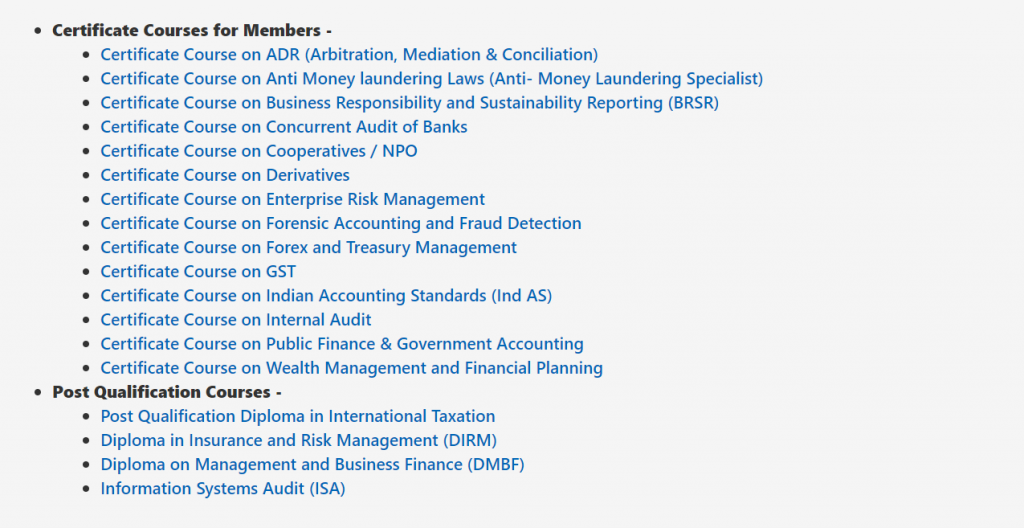The role of a Chartered Accountant (CA) holds immense appeal for numerous commerce students in India. However, many individuals choose not to stop at this juncture and instead aspire to cultivate an extraordinary career trajectory through supplementary courses. CA Wizard presents an assortment of courses that follow the completion of the CA designation, designed to enhance earning potential and bolster one’s resume.
While there was a period when being a CA stood as a prestigious profession in its own right, contemporary factors such as heightened competition and an expanding pool of Chartered Accountants have somewhat diminished this exclusivity. As the landscape of finance and accounting forges ahead with diversification, it is recommended that individuals pursue post-CA courses to ensure the prospect of a lucrative salary and a more fortified professional profile.

A chartered accountant profession emerges from the commerce domain, equipping individuals with specialized knowledge in the realm of finance. Those who aim to broaden their skill repertoire can opt for supplementary courses that offer added value, including concise yet impactful financial courses. Furthermore, numerous online platforms offer certification courses tailored for CA students. These comprehensive listings encompass a diverse array of courses, in addition to outlining the spectrum of career opportunities that open up after achieving the CA qualification. These details can be explored further in the subsequent sections of the article.
Value-Addition Courses for CA
The trend of seeking employment with multinational corporations (MNCs) is experiencing rapid growth due to enticing salary increments and associated perks. Several short-duration value addition courses can significantly enhance your prospects of securing a CA job beyond the borders of India. These courses are designed to be pursued part-time, even while engaged in ongoing employment, thus avoiding the need for extensive study hours. Importantly, these succinct value addition courses not only cultivate skill sets but also pave the way for a safe and secure job abroad.
CPA US (Certified Public Accountant): Aspirations of pursuing opportunities in foreign countries often occupy our thoughts. The CPA qualification serves as a recognized credential for CAs, enabling them to work within the United States and thereby fulfilling the dream of international employment. The American Institute of Certified Public Accountants confers the CPA degree. While the average salary for CPAs in India ranges between 6 to 7 lakhs, remuneration varies in different nations.
CIMA (Chartered Institute of Management Accountants): CIMA, or the Chartered Institute of Management Accountants, imparts knowledge in strategic management. This qualification holds global recognition in countries such as the US and Australia. On average, CIMA professionals earn around Rs. 10.9 lakhs annually. Certain CIMA members have even reported earnings surpassing Rs. 30 lakhs per annum.
ACCA (Association of Chartered Certified Accountants): For those aspiring to work with multinational enterprises overseas, the ACCA certification presents a notable career opportunity. This globally esteemed credential can offer job security on an international scale. The average annual pay scale for ACCA professionals typically ranges between 4 to 15 lakhs.
Online Certification Courses after CA
ICAI, the Institute of Chartered Accountants of India, offers a diverse range of online certification courses tailor-made for its CA members. The primary objective behind these courses is to foster skill development and help professionals discover their niche within the accounting realm. These courses encompass a spectrum of topics, including Finance Modeling, Business Analytics, and Strategic Planning, among others.
Moreover, the offerings extend to encompass specialized certifications in areas like Money Laundering, Foreign Exchange, and Public Finance. ICAI underscores the notion that obtaining the CA qualification might not necessarily mark the culmination of one’s learning journey; continuous growth and honing of skills are imperative for gaining renown and recognition.
Membership with the organization is the sole eligibility criterion for participating in these courses. The list of certification courses is expansive and spans a range of subjects. While the fees vary from course to course, none of them are exorbitant, with costs typically falling within the 8K-10K range.
Here is the compilation of all available certification courses:
Certificate Courses for Members of ICAI:
- ADR (Arbitration, Mediation & Conciliation)
- Anti Money Laundering Laws (Anti-Money Laundering Specialist)
- Business Responsibility and Sustainability Reporting (BRSR)
- Concurrent Audit of Banks
- Cooperatives / NPO
- Certificate Course on Derivatives
- Enterprise Risk Management
- Forensic Accounting and Fraud Detection
- Forex and Treasury Management
- GST
- Indian Accounting Standards (Ind AS)
- Internal Audit
- Public Finance & Government Accounting
- Wealth Management and Financial Planning
Post Qualification Courses:
- Post Qualification Diploma in International Taxation
- Diploma in Insurance and Risk Management (DIRM)
- Diploma in Management and Business Finance (DMBF)
- Information Systems Audit (ISA)

Post Qualification Courses for Higher Earnings After CA.
Exploring additional career avenues post-CA to secure higher salaries is a viable strategy. Here are courses that can be pursued after CA for lucrative prospects. These career paths can be pursued through comprehensive examinations.
Investment Management:
For those captivated by the opulent lives of high-earning bankers, investment management presents a promising trajectory. Courses offered by top universities like the University of Geneva or Yale University, such as Investment Management, Financial Markets, and Advanced Valuation and Strategy, pave the way for investment banking. Financial modeling and valuation skills complement this path. Investment managers are hired by prominent financial institutions, offering substantial salaries and perks. Initial earnings start around 9-10 lakhs per annum.
CFA (Chartered Financial Analyst):
A CFA is a gem in a financial career crown, focusing on investment and asset management. With its specialized focus, CFA enhances the CA’s financial expertise. Spanning three-part exams and necessitating two years of work experience, the CFA course takes around four years to complete after graduation. It encompasses portfolios like Portfolio Management, Valuations, Stock Trading, and more. CFA pass rates tend to be higher than CA. The average salary ranges from 9 to 12 lakhs per annum.
LLB (Bachelors of Law):
The surge in popularity for LLB among the youth brings diversity to careers. An LLB pursued after CA opens diverse avenues, with government job prospects and the capacity to handle cases in various legal fields. It’s permitted by Clause (7) of Part I of the First Schedule for a CA to pursue LLB and become a lawyer. From Corporate Law to International Law, LLB offers varied specializations. Corporate law roles yield minimum salaries of around 8 to 10 lakhs per annum.
FRM (Financial Risk Manager):
Similar to investment banking, financial risk managers work in financial institutions or MNCs. The FRM course requires two exams, generally completed within a year. This course teaches vital research and analytics tools. While shorter, it might pose challenges for those lacking mathematical aptitude. Profiles include Risk Manager or Credit Manager in the Banking, Insurance, or Consulting sectors. The starting salary is around 8 lakhs INR.
CS (Company Secretary):
Many CAs choose to complement their CA degree with CS. The course structure and examination pattern bear strong resemblance. However, the market features numerous CS professionals, contributing to competition. Initial earnings for a CA with CS can range from 7 to 8 lakhs INR. CS provides expertise in corporate law while enhancing audit and taxation specialization.
Conclusion:
The CA designation, once exclusive, now finds widespread presence. Staying relevant through continuous learning is vital. After CA, a plethora of courses promise enhanced career outcomes. Yet, careful research is imperative before pursuing any course. The provided analysis delves into in-depth details for each course, offering post-CA avenues for substantial earnings.






